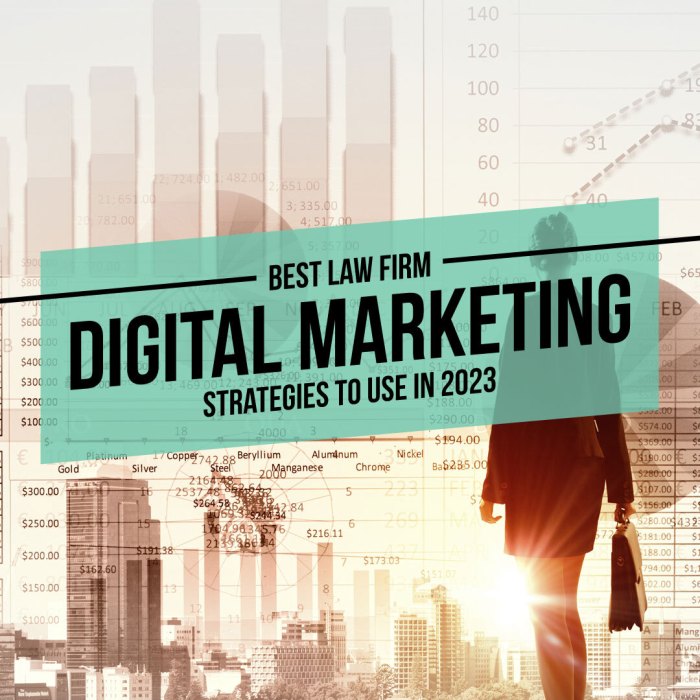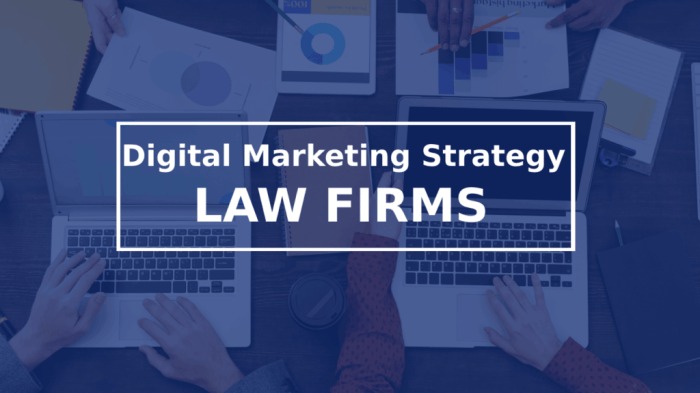
10 Powerful Online Marketing Strategies for Law Firms in 2025 sets the stage for this enthralling narrative, offering readers a glimpse into a story that is rich in detail and brimming with originality right from the start. Online marketing has evolved significantly over the years, especially for law firms, and this guide will delve into the latest strategies to help them thrive in the digital landscape of 2025.
The following paragraphs will delve deeper into the various aspects of online marketing strategies tailored specifically for law firms, providing valuable insights and practical tips for success.
Overview of Online Marketing Strategies for Law Firms
Online marketing for law firms has evolved significantly over the years, adapting to the digital landscape and changing consumer behavior. In the past, law firms relied heavily on traditional marketing methods such as print ads, billboards, and TV commercials to reach potential clients.
However, with the rise of the internet and social media, online marketing has become essential for law firms to stay competitive in 2025.
Importance of online marketing strategies in 2025 lies in the fact that a strong online presence can help law firms reach a wider audience, build credibility, and attract potential clients. With more people turning to the internet to find legal services, law firms need to utilize online marketing strategies to stand out from the competition and connect with their target market effectively.
Key Differences Between Traditional and Online Marketing for Law Firms
Traditional marketing for law firms involves one-way communication through channels like print, radio, and TV, whereas online marketing allows for two-way communication, engagement, and interaction with the audience. Online marketing also offers more targeted and cost-effective strategies compared to traditional methods.
- Online marketing provides measurable results through analytics and data tracking, allowing law firms to monitor the success of their campaigns in real-time.
- Traditional marketing relies on broad reach and repetition, while online marketing can target specific demographics and interests, reaching the right audience more effectively.
- Online marketing allows for personalized content and communication, creating a more engaging and interactive experience for potential clients.
- Traditional marketing often has higher costs and longer lead times, while online marketing offers quicker implementation and results, making it more adaptable to changing market conditions.
Website Optimization for Law Firms
In 2025, a law firm website needs to be optimized to attract potential clients, establish credibility, and provide valuable information. The website should be user-friendly, visually appealing, and optimized for search engines.
Essential Elements of a Law Firm Website in 2025
- Clear and concise messaging to convey the firm's expertise and services.
- Professional design with easy navigation for users to find information quickly.
- High-quality content, including blog posts, case studies, and legal resources.
- Strong calls-to-action to encourage visitors to contact the firm or schedule a consultation.
- Contact information prominently displayed on every page for easy access.
Comparison of Different Website Optimization Techniques for Law Firms
- Optimization: Implementing s, meta tags, and high-quality content to improve search engine rankings.
- Local : Optimizing the website for local searches by including location-based s and creating Google My Business listings.
- Content Marketing: Regularly publishing informative and engaging content to attract and retain visitors.
- Responsive Design: Ensuring the website is mobile-friendly and adjusts to different screen sizes for a seamless user experience.
- Site Speed Optimization: Improving website loading times to reduce bounce rates and improve user engagement.
Role of Mobile Responsiveness in Website Optimization for Law Firms
Mobile responsiveness is crucial for law firm websites in 2025 as more people access the internet through mobile devices. A mobile-friendly website ensures that users can easily navigate, read content, and contact the firm on their smartphones or tablets. Google also prioritizes mobile-friendly websites in search results, making mobile responsiveness essential for and overall visibility.
Content Marketing Strategies
Content marketing is a crucial aspect of online marketing strategies for law firms. By creating valuable and relevant content, law firms can attract and engage their target audience, establish credibility, and ultimately drive traffic and conversions to their website.
Types of Content for Law Firm Audiences
- Blog Posts: Informative articles on legal topics, case studies, and industry trends.
- Whitepapers: In-depth reports on complex legal issues or new legislation.
- Infographics: Visual representations of data or processes related to legal matters.
- Webinars: Live or recorded presentations on relevant legal topics.
- Podcasts: Audio content discussing legal news, insights, and advice.
Establishing Thought Leadership
Content marketing allows law firms to position themselves as thought leaders in their field. By consistently producing high-quality content that addresses common pain points, offers solutions, and showcases expertise, law firms can build trust with their audience and differentiate themselves from competitors.
Tips for Creating Engaging Content
- Understand Your Audience: Tailor content to address the specific needs and interests of your target clients.
- Use Compelling Headlines: Capture attention and entice readers to click and read more.
- Include Visuals: Use images, videos, and infographics to enhance the readability and shareability of your content.
- Optimize for : Incorporate relevant s and meta tags to improve search engine visibility.
- Promote Across Channels: Share your content on social media, email newsletters, and other platforms to reach a wider audience.
Social Media Marketing for Law Firms
In today's digital age, social media has become a powerful tool for law firms to connect with their audience, build brand awareness, and generate leads. Let's explore the most effective social media platforms for law firms in 2025 and the importance of community engagement in social media marketing.
Most Effective Social Media Platforms for Law Firms in 2025
- LinkedIn: Known as the go-to platform for professionals, LinkedIn is ideal for law firms to showcase expertise, share industry insights, and connect with potential clients.
- Instagram: With its visual appeal, Instagram allows law firms to humanize their brand, share behind-the-scenes content, and engage with a younger audience.
- TikTok: As video content continues to dominate social media, law firms can leverage TikTok to create engaging and informative short videos to reach a wider audience.
Examples of Successful Social Media Campaigns by Law Firms
- A law firm specializing in personal injury law launched a campaign on Facebook targeting local communities affected by accidents, offering free consultations and legal advice. The campaign resulted in a significant increase in inquiries and client acquisitions.
- Another law firm created a series of educational videos on YouTube addressing common legal issues faced by individuals, establishing themselves as a trusted source of information and attracting new clients.
Importance of Community Engagement in Social Media Marketing for Law Firms
Community engagement plays a crucial role in social media marketing for law firms as it helps build credibility, trust, and relationships with their audience. By actively responding to comments, messages, and feedback, law firms can show their commitment to client satisfaction and establish themselves as approachable and reliable legal experts.
Search Engine Optimization () for Law Firms
Search Engine Optimization () plays a crucial role in increasing online visibility for law firms. By optimizing their websites and content according to search engine algorithms, law firms can improve their rankings on search engine results pages (SERPs) and attract more potential clients.
Latest Trends and Best Practices for Law Firms
- Optimize for Voice Search: With the rise of voice search technology, law firms should focus on optimizing their content for voice search queries to improve visibility.
- Mobile Optimization: Ensuring that websites are mobile-friendly is essential, as search engines prioritize mobile-responsive sites in their rankings.
- Quality Content: Creating high-quality, relevant content that provides value to users is key to ranking well in search results.
- Local : Implementing local strategies, such as optimizing Google My Business listings and local s, can help law firms target specific geographic regions and attract local clients.
- Featured Snippets: Optimizing content to appear in featured snippets can increase visibility and drive more traffic to a law firm's website.
Importance of Local for Law Firms Targeting Specific Regions
Local is especially important for law firms targeting specific regions because it helps them appear in local search results when potential clients are looking for legal services in their area. By optimizing their website for local s, creating location-specific content, and managing their online reviews, law firms can improve their visibility among local audiences and attract more clients in their target regions.
Paid Advertising Strategies
In today's digital age, paid advertising has become an essential component of online marketing strategies for law firms. By utilizing various platforms and techniques, law firms can effectively reach their target audience and generate leads. Let's explore some key aspects of paid advertising strategies for law firms.
Comparison of Paid Advertising Platforms
When it comes to paid advertising platforms, law firms have several options to choose from, including Google Ads, Facebook Ads, LinkedIn Ads, and more. Each platform offers unique targeting capabilities and features that cater to different types of audiences. It's essential for law firms to evaluate their goals and target demographic to determine which platform would be most effective for their advertising campaigns.
- Google Ads: Google Ads, formerly known as Google AdWords, is a popular choice for law firms looking to target users actively searching for legal services. With Google Ads, law firms can bid on relevant s and display their ads at the top of search engine results pages.
- Facebook Ads: Facebook Ads allow law firms to target specific demographics based on interests, behaviors, and other criteria. Law firms can create engaging ad creatives and reach a broader audience on the world's largest social media platform.
- LinkedIn Ads: LinkedIn Ads are ideal for law firms targeting professionals and businesses. With LinkedIn Ads, law firms can reach decision-makers and professionals in specific industries, making it a valuable platform for B2B marketing.
Benefits of PPC Advertising for Law Firms
Pay-Per-Click (PPC) advertising offers several benefits for law firms, including:
- Targeted Reach: PPC advertising allows law firms to target specific s, demographics, and locations, ensuring their ads are seen by the right audience.
- Cost-Effective: With PPC advertising, law firms only pay when users click on their ads, making it a cost-effective way to drive traffic to their website and generate leads.
- Measurable Results: PPC advertising provides detailed analytics and performance metrics, allowing law firms to track the success of their campaigns and optimize them for better results.
Tips for Optimizing Ad Campaigns
To maximize ROI and improve the effectiveness of ad campaigns, law firms can follow these tips:
- Perform Research: Conduct thorough research to identify relevant s that potential clients are searching for.
- Optimize Ad Copy: Create compelling ad copy that highlights the unique value proposition of the law firm and encourages users to take action.
- Use Ad Extensions: Take advantage of ad extensions to provide additional information, such as location, phone number, and links to specific pages on the website.
- Monitor Performance: Regularly monitor the performance of ad campaigns and make adjustments to optimize for better results.
Email Marketing Campaigns
When it comes to online marketing strategies for law firms, email marketing can be a powerful tool for client acquisition and retention. By effectively utilizing email campaigns, law firms can stay connected with their current clients and attract new ones.
Key Components of a Successful Email Marketing Campaign
For a successful email marketing campaign for law firms, it is essential to focus on the following key components:
- Compelling subject lines that grab the recipient's attention.
- Personalized content that resonates with the target audience.
- Clear call-to-action (CTA) to guide recipients on the next steps.
- Mobile-responsive design for easy viewing on various devices.
- Consistent branding to reinforce brand recognition.
Examples of Effective Email Marketing Strategies
Some effective email marketing strategies for client acquisition and retention in the legal industry include:
- Sending out newsletters with relevant legal updates and insights.
- Offering exclusive promotions or discounts to encourage engagement.
- Providing educational content through webinars or e-books.
- Requesting feedback through surveys to improve client experience.
- Automating follow-up emails to nurture leads and build relationships.
Importance of Personalization and Segmentation
Personalization and segmentation play a crucial role in email marketing for law firms as they help tailor content to the specific needs and interests of recipients. By segmenting email lists based on demographics, behavior, or preferences, law firms can deliver more relevant and targeted messages, leading to higher engagement and conversion rates.
Online Reputation Management

Online reputation management is crucial for law firms in 2025 to maintain a positive image and credibility in the digital space. It involves monitoring, influencing, and responding to what is being said about a law firm online.
Strategies for Monitoring and Responding to Online Reviews and Feedback
Monitoring online reviews and feedback is essential for law firms to understand how they are perceived by clients and potential clients. Here are some strategies for effectively managing online reviews:
- Set up Google Alerts to receive notifications whenever your law firm is mentioned online.
- Regularly check review sites like Google My Business, Yelp, and Avvo for new reviews.
- Respond promptly to both positive and negative reviews to show that your law firm values feedback and is committed to addressing any concerns.
Building and Maintaining a Positive Online Reputation
Building and maintaining a positive online reputation requires a proactive approach. Here are some ways law firms can enhance their online reputation in 2025:
- Create high-quality, informative content on your website and social media platforms to showcase your expertise and establish trust with potential clients.
- Engage with your audience on social media by responding to comments and messages in a timely and professional manner.
- Implement a review generation strategy to encourage satisfied clients to leave positive reviews and ratings online.
- Monitor your online presence regularly and address any negative comments or reviews promptly to prevent reputational damage.
Video Marketing Strategies
Incorporating video marketing into the online strategy for law firms can bring numerous benefits. Video content is engaging, easily shareable, and helps in establishing a personal connection with the audience. It can also improve search engine optimization () efforts, boost brand awareness, and enhance credibility and trust among potential clients.
Benefits of Video Marketing for Law Firms
- Enhanced Engagement: Videos are more likely to capture the attention of viewers and keep them engaged compared to written content.
- Improved Brand Visibility: Video content can help law firms stand out in a crowded online space and increase brand recognition.
- Increased Conversion Rates: Including videos on landing pages or in email campaigns can lead to higher conversion rates and drive more inquiries.
- Building Trust: Videos allow law firms to showcase their expertise, team members, and success stories, helping to build trust with potential clients.
Engaging Video Content Ideas for Law Firms
- Client Testimonials: Record video testimonials from satisfied clients sharing their positive experiences with your firm.
- FAQ Sessions: Create videos answering common legal questions or explaining complex legal concepts in a simple and engaging manner.
- Behind-the-Scenes: Offer a glimpse into the daily operations of your law firm to humanize your brand and connect with your audience.
- Case Studies: Present successful case outcomes in a compelling storytelling format to demonstrate your firm's expertise and track record.
Impact of Video Marketing on Audience Engagement and Conversion Rates
- Increased Audience Retention: Videos tend to hold viewers' attention longer, leading to higher retention rates and increased chances of conversion.
- Improved Click-Through Rates: Including video thumbnails in email campaigns or social media posts can boost click-through rates and drive traffic to your website.
- Enhanced Brand Recall: Viewers are more likely to remember video content compared to text, which can help in reinforcing your brand message and services.
Analytics and Performance Tracking

In the digital age, analytics and performance tracking play a crucial role in evaluating the success of online marketing strategies for law firms. By analyzing data and key metrics, law firms can make informed decisions to optimize their marketing efforts and improve their overall online presence.
Key Metrics for Law Firms to Track
- Website Traffic: Monitoring the number of visitors to your website can provide insights into the effectiveness of your online marketing campaigns.
- Conversion Rate: Tracking the percentage of website visitors who take a desired action, such as filling out a contact form or requesting a consultation, can help gauge the success of your conversion strategies.
- Click-Through Rate (CTR): Evaluating the CTR of your online ads or email campaigns can indicate how engaging your content is to your target audience.
- Performance: Monitoring rankings, organic traffic, and backlink profile can help assess the effectiveness of your search engine optimization efforts.
The Importance of Data-Driven Insights
Data-driven insights derived from analytics can provide law firms with valuable information to make informed marketing decisions. By analyzing trends, consumer behavior, and campaign performance, law firms can identify areas for improvement, refine their strategies, and allocate resources effectively to achieve their marketing goals.
Summary
In conclusion, 10 Powerful Online Marketing Strategies for Law Firms in 2025 offers a roadmap for law firms to navigate the ever-changing digital marketing landscape with confidence and innovation. By implementing these strategies effectively, law firms can establish a strong online presence, attract new clients, and stay ahead of the competition in the years to come.
Expert Answers
What are the key differences between traditional and online marketing for law firms?
Traditional marketing relies on offline channels like print media and events, while online marketing leverages digital platforms such as social media and search engines to reach a wider audience in 2025.
How can law firms optimize their websites for better performance in 2025?
Law firms can optimize their websites by focusing on mobile responsiveness, fast loading speeds, user-friendly navigation, high-quality content, and best practices to enhance user experience and search engine visibility.
Which social media platforms are most effective for law firms in 2025?
In 2025, platforms like LinkedIn, Twitter, and Instagram are proving to be highly effective for law firms to engage with their target audience, share valuable content, and establish thought leadership in the industry.
How important is video marketing for law firms in 2025?
Video marketing plays a crucial role in capturing audience attention, conveying messages effectively, and boosting engagement and conversion rates for law firms in 2025, making it a powerful tool in their online marketing arsenal.
Why is online reputation management vital for law firms?
Online reputation management is crucial for law firms to maintain a positive brand image, build trust with clients, and address any negative feedback or reviews effectively to uphold their credibility and reputation in the digital sphere.













